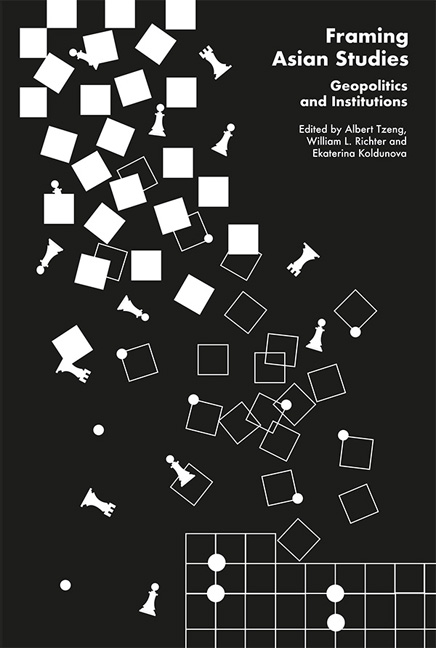Book contents
- Frontmatter
- Contents
- Foreword
- The Contributors
- 1 Introduction: Framing Asian Studies
- I Contested “Asia”
- II Geopolitical Framing of Western Discourse
- 5 From Geertz to Ricklefs: The Changing Discourse on Javanese Religion and its Wider Contexts
- 6 Framing Cambodian Affairs: French and American Scholarship, Media and Geopolitics
- 7 Studying Taiwan: The Politics of Area Studies in the United States and Europe
- III Asian Studies in Former Soviet States
- IV Inter-Asian Gazes
- Index
6 - Framing Cambodian Affairs: French and American Scholarship, Media and Geopolitics
from II - Geopolitical Framing of Western Discourse
Published online by Cambridge University Press: 28 June 2018
- Frontmatter
- Contents
- Foreword
- The Contributors
- 1 Introduction: Framing Asian Studies
- I Contested “Asia”
- II Geopolitical Framing of Western Discourse
- 5 From Geertz to Ricklefs: The Changing Discourse on Javanese Religion and its Wider Contexts
- 6 Framing Cambodian Affairs: French and American Scholarship, Media and Geopolitics
- 7 Studying Taiwan: The Politics of Area Studies in the United States and Europe
- III Asian Studies in Former Soviet States
- IV Inter-Asian Gazes
- Index
Summary
The turbulence of internal conflicts, the takeover by the Khmer Rouge (1975–79) and the Vietnamese intervention (1979–89) attracted international media attention to the Kingdom of Cambodia. The United States and France stand out among the nations that became entangled in the geopolitics surrounding Cambodian affairs in these years. Their political perspectives also dominated media debates, referred to here as “mediatizations” because of the non-fact-based nature of these discourses that express a partisan view. The dynamics of the media's “agenda-setting” and “framing” of Cambodian issues have distinct qualities, which will be examined in this chapter (Lippman 1922). These dynamics are understood as the selective influencing of perceptions in the representation of Cambodian issues in the French and American press, thus the mediatization of practices outside of the country. Descriptions, examples and case studies will show how the social construction and evolution of these media frames are related to geopolitical relations and scholarly traditions. The findings contribute to the understanding of how and why the period of the Khmer Rouge is labelled as “genocide” while not actually fitting the conditions that define this category. The labelling as genocide, nevertheless, evolved into a discourse adopted by, among others, the Cambodian Genocide Program at Yale University and has been attached to the international perception of Cambodian society ever since.
A study of the geopolitical dimension of the mediatization of Cambodian affairs is relevant, as few analyses have been conducted on the distinct character of the framing of issues in the decades following the traumatic events of the Khmer Rouge. The dynamics and their relation to geopolitical as well as national trends and traditions have not been studied as an integrated Cambodian history. While both France and the United States have produced their fair share of “leftist”, socialistinspired, and “rightist”, conservative-inspired, reporting, they have their basis in different traditions. As documented in, among others, Clymer (2007), Edwards (2007), Gunn and Lee (1991) and Wijers (2013), France's relations can be characterized as founded in a paternalist discourse on Cambodia as a former colony with a rich cultural heritage and a “sweet-natured and innocent” population. In contrast, the United States rather seemed to perceive Cambodia as a pawn in Cold War politics and a supportive neighbour to a former U.S. foe, Vietnam.
- Type
- Chapter
- Information
- Framing Asian StudiesGeopolitics and Institutions, pp. 120 - 141Publisher: ISEAS–Yusof Ishak InstitutePrint publication year: 2018



